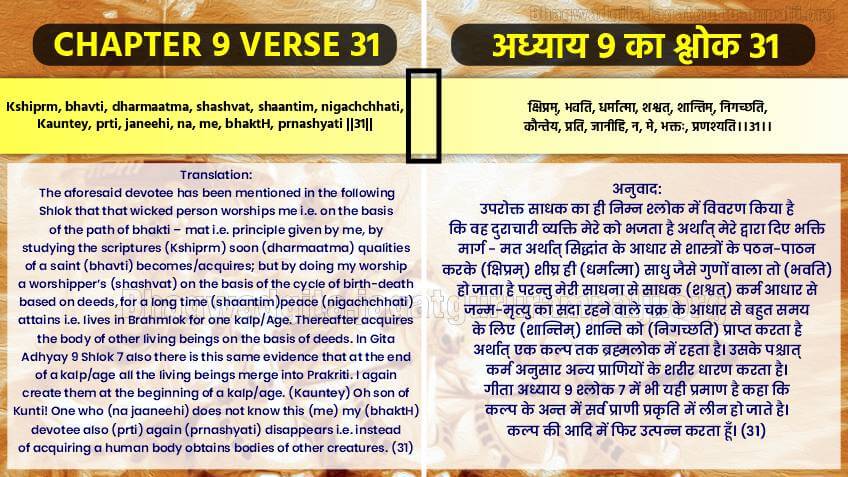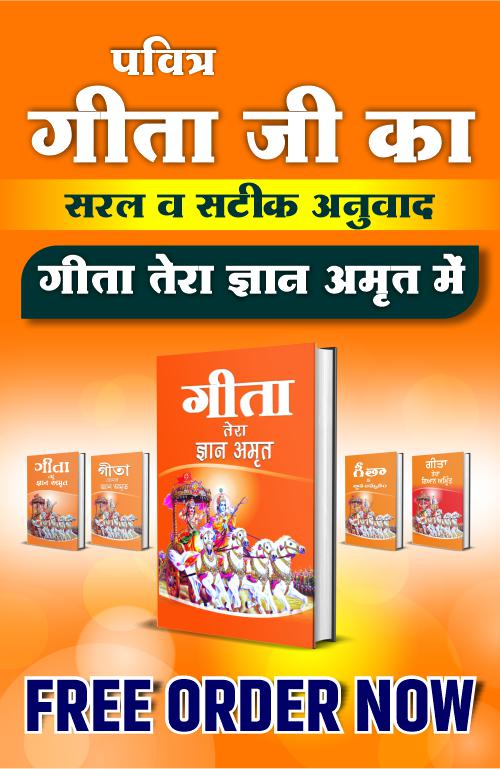
Kshiprm, bhavti, dharmaatma, shashvat, shaantim, nigachchhati,
Kauntey, prti, janeehi, na, me, bhaktH, prnashyati ||31||
Translation: The aforesaid devotee has been mentioned in the following Shlok that that wicked person worships me i.e. on the basis of the path of bhakti – mat i.e. principle given by me, by studying the scriptures (Kshiprm) soon (dharmaatma) qualities of a saint (bhavti) becomes/acquires; but by doing my worship a worshipper’s (shashvat) on the basis of the cycle of birth-death based on deeds, for a long time (shaantim) peace (nigachchhati) attains i.e. lives in Brahmlok for one kalp/Age. Thereafter acquires the body of other living beings on the basis of deeds. In Gita Adhyay 9 Shlok 7 also there is this same evidence that at the end of a kalp/age all the living beings merge into Prakriti. I again create them at the beginning of a kalp/age. (Kauntey) Oh son of Kunti! One who (na jaaneehi) does not know this (me) my (bhaktH) devotee also (prti) again (prnashyati) disappears i.e. instead of acquiring a human body obtains bodies of other creatures. (31)
Translation
The aforesaid devotee only has been mentioned in the following Shlok that, that wicked person worships me i.e. on the basis of the path of bhakti – mat i.e. principle given by me, by studying the scriptures soon acquires the qualities of a saint, but by doing my worship that worshipper, on the basis of the cycle of birth-death based on deeds attains peace for a long time i.e. lives in Brahmlok for one kalp/age. Thereafter acquires the body of other living beings on the basis of deeds. In Gita Adhyay 9 Shlok 7 also there is this same evidence that at the end of a kalp/age all the living beings merge into Prakriti. I again create them at the beginning of a kalp/age. Oh son of Kunti! Even my devotee, who does not know this, again disappears i.e. instead of acquiring a human body obtains bodies of other creatures.
Important
Its evidence has been clarified in Holy Gita Adhyay 7 Shlok 18 and Gita Adhyay 4 Shlok 40 that a worshipper who has deviated from the path gets destroyed, and in Gita Adhyay 6 Shlok 30, the meaning of “Prnshyati” is written as “disappear”. In this Shlok 30 this meaning has been written twice. Therefore, here in Adhyay 9 Shlok 31 also, the meaning of “Prnshyati” “to disappear” is suited. Therefore has said in Gita Adhyay 18 Shlok 62 that Arjun, you should go in the refuge of that God in every respect; by His grace only you will attain supreme peace and the eternal supreme abode i.e. Satlok. Its evidence is also in Gita Adhyay 15 Shlok 4 that oh Arjun, after finding the Tatvdarshi Saint mentioned in Gita Adhyay 4 Shlok 34, one should search for that Param Pad Parmeshwar (Supreme State God), having gone in whom, the worshippers do not return in birth-death in this world i.e they attain complete salvation. The Supreme God from whom the world-like tree has expanded i.e. the Supreme God who has created all the brahmands. I also am in the refuge of that Eternal (Purush Parmeshwar) Supreme God. Therefore, one should only do bhakti of that Supreme God (Purna Parmatma).
क्षिप्रम्, भवति, धर्मात्मा, शश्वत्, शान्तिम्, निगच्छति,
कौन्तेय, प्रति, जानीहि, न, मे, भक्तः, प्रणश्यति।।31।।
अनुवाद: उपरोक्त साधक का ही निम्न श्लोक में विवरण किया है कि वह दुराचारी व्यक्ति मेरे को भजता है अर्थात् मेरे द्वारा दिए भक्ति मार्ग - मत अर्थात् सिद्धांत के आधार से शास्त्रों के पठन-पाठन करके (क्षिप्रम्) शीघ्र ही (धर्मात्मा) साधु जैसे गुणों वाला तो (भवति) हो जाता है परन्तु मेरी साधना से साधक (शश्वत्) कर्म आधार से जन्म-मृृत्यु का सदा रहने वाले चक्र के आधार से बहुत समय के लिए (शान्तिम्) शान्ति को (निगच्छति) प्राप्त करता है अर्थात् एक कल्प तक ब्रह्मलोक में रहता है। उसके पश्चात् कर्म अनुसार अन्य प्राणियों के शरीर धारण करता है। गीता अध्याय 9 श्लोक 7 में भी यही प्रमाण है कहा कि कल्प के अन्त में सर्व प्राणी प्रकृृति में लीन हो जाते है। कल्प की आदि में फिर उत्पन्न करता हूँ। (31)
(कौन्तेय) हे कुंती पुत्र! जो यह (न जानीहि) नहीं जानता (मे) मेरा (भक्तः) भक्त भी (प्रति) वापिस (प्रणश्यति) अदृृश्य हो जाता है अर्थात् मानव शरीर न प्राप्त करके अन्य प्राणियों के शरीर प्राप्त करता है।
विशेष:- इसी का प्रमाण पवित्रा गीता अध्याय 7 श्लोक 18, तथा गीता अध्याय 4 श्लोक 40 में स्पष्ट किया है कि पथ भ्रष्ट साधक नष्ट हो जाता है तथा गीता अध्याय 6 श्लोक 30 में प्रणश्यति का अर्थ अदृृश्य होना लिखा है। इस श्लोक 30 में दो बार अर्थ किया है। इसलिए यहाँ अध्याय 9 श्लोक 31 में भी प्रणश्यति का अर्थ अदृृश्य ही अनुकूल है। इसीलिए गीता अध्याय 18 श्लोक 62 में कहा है कि अर्जुन तू सर्व भाव से उस परमात्मा की शरण में जा, उसकी कृप्या से ही तू परमशान्ति को तथा सनातन परम धाम को अर्थात् सतलोक को प्राप्त होगा। इसी का प्रमाण गीता अध्याय 15 श्लोक 4 में भी है कि हे अर्जुन गीता अध्याय 4 श्लोक 34 में वर्णित तत्वदर्शी संत के मिलने पर उस परम पद परमेश्वर की खोज करनी चाहिए, जिसमें गए साधक फिर लौट कर संसार में जन्म-मृत्यु में नहीं आते अर्थात् पूर्ण मोक्ष को प्राप्त करते हैं। जिस परमेश्वर से संसार रूपी वृक्ष विस्तार को प्राप्त हुआ है अर्थात् जिस परमेश्वर ने सर्व ब्रह्मण्डों की रचना की है। मैं भी उसी आदि पुरुष परमेश्वर की शरण में हूँ। इसलिए उसी पूर्ण परमात्मा की भक्ति करनी चाहिए।
